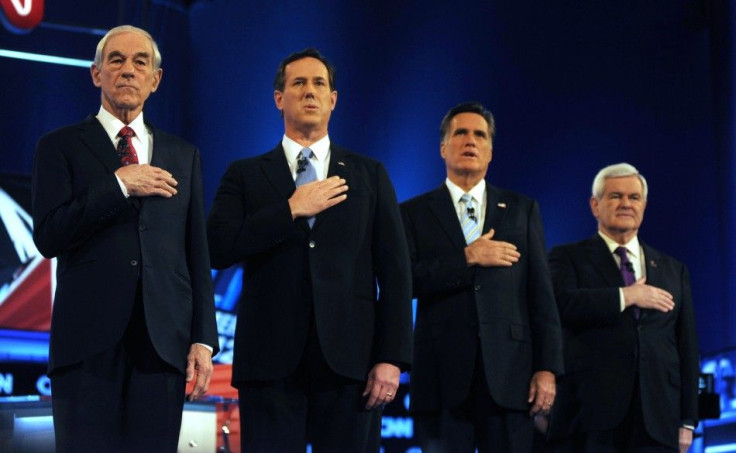Super Tuesday Contests: Latest Poll Information and How the Candidates Are Placed

The Republican presidential race entered a decisive phase on Tuesday with 10 states holding their primaries or caucuses. The topsy-turvy GOP race so far hasn't zeroed in on a candidate to fight President Obama in the November elections.
Though traditionally Super Tuesday is considered the defining day for presidential primaries, neck and neck competition between the GOP presidential candidates this year will apparently push the battle beyond D-day.
In fact this year's Super Tuesday is not that super as only 10 states will hold the contests as compared to the past primary cycles.
In 2000, 16 states held elections on Super Tuesday and 2004 had only a Mini-Tuesday with 7 states going for polls, while 2008 primary elections was dubbed as Super-Duper-Tuesday by pundits, with 24 states choosing to hold primaries on the Super Tuesday.
A total of 410 delegates are up for grabs on March 6, 2012, which is 17.9 percent of the total delegate count. The 10 states that go for polls on Super Tuesday and the latest opinion poll status are given below.
Georgia: The state has the highest delegate count among the Super Tuesday states with 76 delegates on offer. Georgia is the home turf of Newt Gingrich and is the only Super Tuesday state where he has a double digit lead over his rivals. According to the latest opinion polls by Mason-Dixon, Gingrich has 38 percent support followed by Mitt Romney at 24 percent and Rick Santorum at 22 percent. Ron Paul is in the fourth place with 3 percent.
Ohio: Ohio is the next important Super Tuesday state with 66 delegates to offer. According to various polls, Romney and Santorum are in dead heat in the state. The latest NBC News/Marist poll predicts a slight edge to Santorum with 34 percent points over Romney who has 32 percent votes. Gingrich with 15 percent and Paul with 13 percent support are fighting for the third place.
Tennessee: The state has 58 delegates to offer in its GOP primary contest. According to the latest Rasmussen Reports, Santorum leads the race with 34 points, Romney is behind him with 30 points and Gingrich is in the third place with 18 points, followed by Paul with 8 points.
Massachusetts: Considered as Romney's home ground, the state has 41 delegates and Romney is all set to win a convincing victory here. According to a Suffolk/7News opinion poll, Romney has a massive lead here with 64 percent support, followed by Santorum at 16 percent, Paul at 7 percent and Gingrich in with 6 percent. Around 7 percent of voters have said they are undecided at the moment.
Virginia: Forty-nine delegates are up for grabs in the state, where the contest is a duel between Romney and Paul. The remaining two candidates won't be able to contest here as they failed to get the number of signatures required by the state GOP rules. The NBC News/Marist poll has said that Romney has the support of 69 percent of voters in the state, while 26 percent voters support Paul.
Oklahoma: The state is offering 43 delegates and the Rasmussen Report poll of likely voters conducted on Feb. 21, 2012, depicts a clear lead for Santorum with 43 percent of votes followed by Gingrich at 22 percent. Romney is in the third place with 18 percent and Paul has 7 percent share, while 10 percent are undecided.
Vermont: Vermont has 17 delegates to offer. An opinion poll released on Feb. 29 by Castleton State College reports that Romney has a lead in the state with 34 percent of vote share and Santorum trailing him with 27 percent of votes polled. Paul is at the third place with 14 percent of votes and in the last place is Gingrich with 10 percent.
There is no polling information available for Idaho with 32 delegates to offer in a non-binding caucus, as well as from the North Dakota caucus that has 28 delegates.
Alaska too has a two-week-long proportional caucus and will declare its caucus information on Super Tuesday.
© Copyright IBTimes 2025. All rights reserved.






















